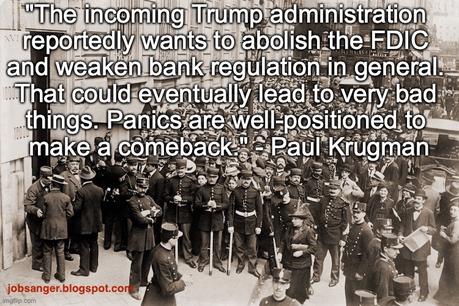
Economist Paul Krugman explains why Trump's desire to abolish the FDIC and deregulate banks is a very bad idea:
The incoming Trump administration reportedly wants to abolish the FDIC and weaken bank regulation in general. And that could eventually lead to very bad things. . . .
We know that Donald Trump has a thing about the 1890s, when men were men, tariffs were high, businesses were free to pollute the air and water, and nobody knew what went on in meatpacking plants. But you can bet your Bitcoin that he’s never heard of the Panic of 1893, a huge wave of contagious bank runs that was catastrophic for industrial production and employment.
Economists actually understand bank runs pretty well.
Normally the illiquidity of most bank assets isn’t a problem, because on any given day only some of a bank’s customers want cash, while others are making deposits, so it’s OK to hold limited amounts of ready cash.
But if for whatever reason depositors fear that a bank may be about to fail, they will rush to pull out their money — and their fears can turn into a self-fulfilling prophecy, because a bank trying to raise money in a hurry can go bankrupt even if it would have been solvent if it had had time to sell at a more deliberate pace. And since the collapse of one bank can cause fears about other banks, bank runs can be contagious.
Deposit insurance made old-fashioned bank runs a thing of the past. But from the beginning it was obvious that protection for depositors had to come with strings. Otherwise banks could play heads I win, tails taxpayers lose: attract funds by offering attractive interest rates, then invest in potentially high-yielding ventures that could also easily go bad. Depositors wouldn’t worry, because they were protected; bank owners would get rich if they were lucky, just walk away if they weren’t.
So deposit insurance had to be accompanied by things like capital requirements that forced bank owners to put their own money at risk and restrictions on the kinds of investments they were allowed to make.
Concerns that unregulated banks would gamble with depositors’ funds weren’t purely hypothetical. The interaction between deposit insurance and deregulation of savings banks in the 1980s turned a modest-sized problem into a huge mess that eventually cost taxpayers around $130 billion — adjusting for inflation and economic growth since then, that’s the equivalent of around $650 billion today.
Now the incoming Trump administration seems eager to deregulate the financial industry. We’re hearing about the possibility of abolishing the FDIC. Deposit insurance would supposedly remain, although it would be absorbed into the Treasury Department. But the FDIC has a lot of institutional experience in bank regulation, which would presumably be lost. And this comes amid a general push to loosen financial regulation, indeed regulation of all types.
I have no idea how far this stuff will go, although Wall Street types are clearly eager to start taking dangerous risks again.
But it does seem like a reasonable guess that panics, along with pollution and polio, are well-positioned to make a comeback.

